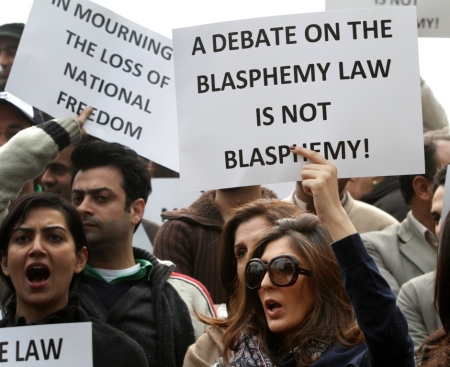Pakistani court upholds life sentence of Christian man accused of blasphemous text messages

A Pakistani Christian’s life sentence for allegedly sending blasphemous text messages was reportedly upheld by a court in Rawalpindi, Pakistan, last week despite his attorney’s claim the prosecution’s evidence was manipulated and his client was framed for the crime.
Fifty-six-year-old Zafar Bhatti will continue to serve a life sentence, which is 25 years in Pakistan, for violating Section 295-C of Pakistan’s blasphemy laws, Morning Star News reported.
The sentence for violating Section 295-C usually is death, but the attorney said he was given a life sentence since there was not enough evidence for the death penalty.
Bhatti continues to deny the charge that he allegedly sent text messages derogatory toward Islam’s prophet.
Bhatti said police tortured him into confessing the blasphemy crime he did not commit, according to religious persecution watchdog International Christian Concern.
He was initially arrested in 2012 and sentenced on May 3, 2017.
Bhatti and his attorney claim he was wrongfully accused of sending the messages from an unregistered number, possibly connected with a woman named Ghazala Khan, who passed away in 2016 from Hepatitis C.
Bhatti’s attorney believes the judge was under pressure to deliver a sentence.
“The trial court judge gave this verdict under immense pressure because the complainant was an office-bearer of the Islamist extremist outfit Ahle Sunnat Wal Jamaat,” Bhatti’s attorney, Tahir Bashir, told the nonprofit persecution news outlet Morning Star News. “I believe the verdict delivered this time was also under pressure because there’s no direct evidence against Bhatti.”
Bashir alleges the evidence was tampered with to frame Bhatti for sending the “blasphemous” text messages through a SIM card and audio recordings.
“When someone calls the cellular company for activation of the SIM card, their voices are recorded,” Bashir said. “In this case, the SIM used in the alleged offense was activated thrice – the first two times by some people related to Ms. Khan, and the third time by the woman herself. Bhatti never possessed the SIM, but his phone set was mysteriously used to send those blasphemous text messages.”
“It’s quite clear that the convict was trapped in the case through his phone,” the attorney said, citing “evidence manipulation.”
Bhatti’s attorney remains hopeful the Lahore High Court will eventually accept Bhatti’s appeal and order his acquittal, despite the “disappointing verdict,” according to Morning Star News.
The Pakistani government is aware its blasphemy laws are misused and often lead to false accusations. Still, little has been done to achieve reform in this area despite calls from the international community.
Human rights activists have advocated for decades to reform Pakistan’s blasphemy laws that disproportionately charge religious minorities due to prejudices and are often based on false accusations, according to the U.S. Commission for International Religious Freedom.
“Vague provisions” found in sections 295 and 298 of Pakistan’s Penal Code criminalize any speech or act “insulting a religion or belief or defiling the Quran, the [Islamic] prophet Muhammad, a place of worship, or religious symbols,” USCIRF reported.
A Pakistani couple on death row for false accusations of blasphemous text messages were recently acquitted after nearly eight years behind bars.
International persecution watchdog group Open Doors USA ranks Pakistan fifth on its 2021 World Watch List of countries where Christians face persecution.
With a population of over 208 million people, there are only about 4 million Christians in Pakistan.
Pakistani Christians face persecution due to an “extreme” level of Islamic oppression. Pakistan is also listed by the U.S. State Department as a "country of particular concern" for tolerating in or engaging in egregious violations of religious freedom.
False accusations of blasphemy in Pakistan, mainly targeting Christians and other minority faiths, are widespread and often fueled by religious hatred or personal vendettas.
Under Pakistan's blasphemy laws, people accused of insulting Islam or its prophet Muhammad can face life in prison, a death sentence or vigilante violence and threats from the community.
Blasphemy accusations can also lead to mass protests and mob violence.
Emily Wood is a reporter for The Christian Post. She can be reached at: emily.wood@christianpost.com





















